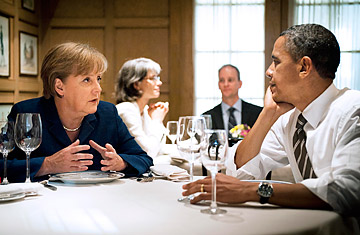
German Chancellor Angela Merkel speaks to President Barack Obama during a private dinner at the 1789 restaurant in Washington June 6, 2011.
Beyond the broad smiles, the jokes about Hillary Clinton's wardrobe, and the ceremonial reassurances that accompanied German Chancellor Angela Merkel's three-day visit to Washington this week, there was a clear message that President Barack Obama expects Germany to demonstrate leadership with NATO and in Europe. Considering the context — Tuesday's love fest on the White House lawn — Obama was outspoken in urging his guest to take more responsibility in Libya, saying that he expected full and robust German support for the ongoing airstrikes.
And so it is hardly surprising that Merkel's defense minister, Thomas de Maiziere, speaking to reporters on the sidelines of a NATO summit in Brussels on Thursday, suggested that Germany could consider sending peace-keeping troops to Libya once Colonel Muammar Gaddafi is out of the way.
Berlin's new posture on Libya is an about-face for Merkel, after Germany alienated its allies when it abstained from the crucial U.N. Security Council vote authorizing military action against Gaddafi's troops. Which is why Obama's decision to award Merkel the Presidential Medal of Freedom and host her at an official state dinner at the White House raised more than a few eyebrows in Washington. And clearly Obama's gesture, even if the decision was made before the Libya vote, had to come at a price.
"Merkel has learned that there is no such thing as a free dinner in Washington," says Josef Braml, an expert on U.S. foreign policy and transatlantic relations at the German Council on Foreign Relations in Berlin. "Not siding with our allies [on Libya] was a major foreign-policy mistake."
German Defense Minister De Maiziere said on Thursday that even though Germany is not engaged militarily in Libya today, Berlin still supports the NATO mission. He said Germany was ready to take responsibility in the post-conflict phase: "We hope there will be a solution which does not require a military presence there, but instead involves economic or infrastructure assistance, perhaps with the formation of security forces."
But that may not be enough for Washington. The U.S. is frustrated that Europe remains fragmented and slow to act on the historic changes sweeping across northern Africa and the Middle East. The U.S., Roger Cohen pointed out in a commentary in the New York Times on the eve of Merkel's visit to Washington, is no longer interested in Europe per se, but only in so far as the two can work together to solve global problems. Once such transcending project that could breathe life into the trans-Atlantic relationship, he argues, is for the U.S. and Europe — with Germany firmly onboard —to work side-by-side to help ensure that democracy prevails after the Arab uprisings.
Another area where the U.S. is looking to Germany to take the lead is the handling of the European sovereign-debt crisis. Concern is growing that the failure of a country like Greece, Portugal or Spain could create a global chain reaction and lead to a new financial crisis. Knowing that bailing out ailing euro members wouldn't go down well with German voters, Merkel at first held out when the euro crisis erupted last year. She ultimately gave in and agreed to participate in the €110-billion ($160 billion) bailout of Greece, but her reluctance has left investors with the impression that the bailouts could still ultimately fail for lack of political support.
No sooner had Merkel returned from Washington on Wednesday than she and her finance minister Wolfgang Schaeuble launched into a new attempt to resolve Greece's debt woes, again clashing with Europe as Germany pursued its own interests. In a letter to his fellow European finance ministers, the European Central Bank (ECB), the International Monetary Fund, and the European Commission, Schaeuble said that, in blunt terms, holders of Greek bonds must make a "quantified and substantial contribution" to a further bailout for Greece. He demanded that private creditors, including many German banks, agree a seven-year extension of maturities of Greek bonds, a defacto restructuring of Greece's public debt. With European voters tired of footing the bill for the debt crisis, Merkel knows she must make the banks pay. But the French — and the Frenchman at the head of the ECB, Jean-Claude Trichet — have opposed any haircut for private bondholders, which include a number of French banks. And so efforts to solve Greece's problems remain stuck over European squabbling.
"As the U.S. looks on," writes Stephen F. Szabo, director of the Transatlantic Academy in Washington, on a German Marshall Fund blog, "it sees Germany as the indispensable power in Europe" -- the one country that can help in Afghanistan, stay tough on Iran, and be a key player on policy towards Russia and relations between former Soviet satellite states and the E.U., all as Washington turns its gaze toward Asia.
Given Merkel's zigzagging on many of the issues important to the U.S., it is fair to ask whether she is really up to the job that Obama expects her to take on. In the absence of a strong, unified Europe able to stand up as a partner for the U.S., Obama does not have much of an alternative to Merkel. Washington is counting on Berlin to realize that history has moved on, that there is no turning back the clock to the days when the U.S. would play the leadership role in Europe. "Berlin will have no choice but to lead or flounder," says Szabo, "So Washington hopes that by treating Angela Merkel as Europe's leader she will start to act like it."
Time will tell if that's just wishful thinking.
